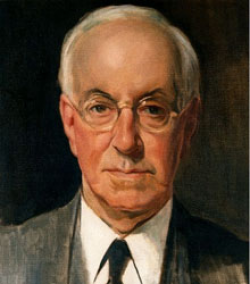Sir Henry Dale

Wellcome Library
- Born
- 9 June 1875
- Died
- 23 July 1968 (age 93)
Sir Henry Dale’s research formed the basis of our understanding of neuroscience. He won the Nobel Prize in 1936 for his achievements, along with Otto Loewi.
Sir Henry was born in London in 1875 and attended the Leys School in Cambridge. He began studying natural sciences at Trinity College in Cambridge, specialising in physiology and zoology. He later studied a clinical course at St Bartholomew’s Hospital London, where he qualified as a doctor. After briefly studying in Frankfurt with Paul Ehrlich, he won a scholarship to University College London to carry out research under E H Starling. It was here that he became friends with Otto Loewi.
During his career, Sir Henry carried out research at the Wellcome laboratories. He later became director of the Department of Biochemistry and Pharmacology at the National Institute for Medical Research (NIMR) where he conducted his most notable research into nerve transmissions and acetylcholine.
Acetylcholine is a chemical found in the brain and nervous system which enables signals to be passed from one neuron (nerve cell) to another across a gap (synapse). This type of chemical is known as a neurotransmitter. Neurotransmitters help send signals around the body and play an important role in muscle contraction as well as in the automatic nervous system (motor nerves, muscles and glands).
Dale and Loewi undertook a range of experiments which showed that acetylcholine occurred naturally in the body. They described its effects on different types of tissue. Before this, there had been little understanding of how signals were passed from one neuron to another across the synapse.
In 1936 the pair won the Nobel Prize for Physiology or Medicine ‘for their discoveries relating to chemical transmission of nerve impulses’. Their findings form some of the basic knowledge behind modern neuroscience research.
The breakdown of acetylcholine pathways has also been associated with diseases such as Alzheimer’s and Myasthenia Gravis (a disease which causes muscles to tire and weaken easily) and current treatments for these diseases target the acetylcholine system.
Sir Henry’s achievements were not limited to laboratory research. He also made huge advancements in the standardisation of drugs during his time at the National Institute of Medical Research. In 1925 he chaired a committee of what is now the World Health Organisation, which led to international standards being set for the preparation of drugs including insulin and digitalis.
Sir Henry was appointed as chairman of the Royal Society in 1938. He stayed in this post until 1960. During the Second World War he served on the scientific advisory committee to the Government. In 1942 he was given an Order of Merit, the UK’s highest honour which can be given by the monarch.



